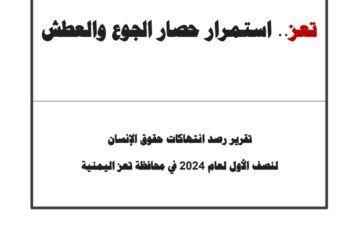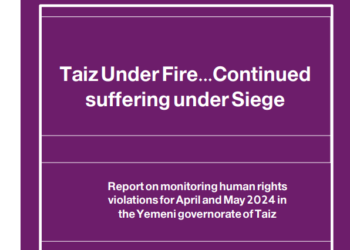International experts affirm the issue of human rights in Yemen of international concern and the principle of accountability must be activated for all perpetrators of crimes
Kamal Al-Jendoubi, head of the United Nations’ Panel of Eminent Experts in Yemen, said that Yemen’s suffering is not a secret and cannot be withheld for long. “Yemen has friends and you will not be left alone.
In the discussion of the symposium, which is part of the Regional Information Center program dealing with “the international responsibility to protect and support civilians during conflicts”, Al-Jandoubi emphasized that the United Nations expert group represents the only independent mechanism to investigate Yemen.
Al-Jandoubi adds about the role and tasks of the prominent team of experts for Yemen, according to the mandate, by the United Nations Human Rights Council’s decision. Which gave the team the task of investigating different types of violations, stressing that the team is making a great effort to get to know all the details that the human rights field in Yemen witnesses from gross violations. So that the report will be conducted The Human Rights Council at the next session, as well as at the session of the United Nations General Assembly.
The Chairman of the Jendobi Experts Group noted that Taiz is one of the priorities of the team and added, “We have asked everyone about the situation in Taiz, and we were unable to work as a result of the lack of response by all parties. We seek direct communication and put our feet in Yemen and we hope that those parties will answer.”
In turn, Dr. Al-Obaid Ahmed Al-Obaid, Director of the Office of the High Commissioner for Human Rights in Yemen, affirmed that the solution in Yemen will only be achieved through accountability and ensuring that all violators of human rights are held accountable.
Al-Obaid said, “Everyone does not disagree on the love of Yemen, but the absence of the state’s role is the one that helped exacerbate human rights violations.” Referring to the harassment and threats suffered by the commission, which was because of its statements about the bombing of Taiz, and that the neutrality of the commission comes from the premise that all parties want Speak from her angle and this will not happen.
Al-Obaid indicated that what UNHCR’s monitoring and documentation activities will inevitably be the cornerstone of the issue of accountability and accountability that is imperative in the future in order to uphold the process of justice and human rights in Yemen. Noting that the culture of impunity that dominates our mentality should not be the one that controls the path of rights if we really want to get out of the cycle of violence, we also affirm that close monitoring and documentation takes place for all kinds of human rights violations committed by all parties.
For his part, Ambassador Ezzadin Al-Asbahi stressed the need for the monitoring process to violate human rights to be based on showing the truth that fear and intersection of interests do not hinder them, and that international bodies are required to more courage to address the cases of grave violations experienced by Yemen. Al-Asbahi touched on the failure of the international community during the past five years from merely achieving a step in confidence-building priorities such as opening a crossing to save the victims in Taiz or the release of the kidnappers. Houthi did not just a military coup, but also a militia rebellion that brought the country into complete chaos.
While Representative Shawky Al-Qadi stressed the seriousness of the conditions that require a firm stand by international organizations, indicating that the deteriorating human rights situation in all of Yemen has not been heard, despite the magnitude of the crimes.
Lawyer Tawfiq Al-Shaabi reviewed the deteriorating current human rights situation, especially in Taiz. Tawfiq said that Taiz is living a real disaster and a deadly siege by the Houthis, by the epidemics, and in light of the international organizations’ neglect, referring to the fatal state of frustration that controls the street from all human rights activities of the United Nations or organizations Human Rights.
Further, Arafat Al-Rafid, Executive Director of the Center for Information and Rehabilitation for Human Rights, stressed the continuation of joint work between international organizations and civil society in a manner that achieves the ultimate goal of safeguarding human rights and stopping the existing violations from all sides.
The symposium during the two and a half hours of in-depth discussion via visual communication technology addressed the challenges of working in front of international organizations and community institutions and how to activate these roles in a way that serves the path of protecting human rights and human dignity in Yemen.
International officials pointed to the importance of preparing data and documents that establish the course of accountability and prosecuting all the perpetrators of crimes.
The symposium touched on several axes, namely the reality of human rights in Yemen in light of the armed conflict, the spread of epidemics and its impact on the health situation and the human rights situation, the role of international organizations in providing aid under the current circumstances.
4 / 6 / 2020
Watch it in Arabic:








